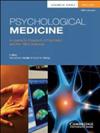社交焦虑症患者在接受注意力偏差修正治疗或选择性血清素再摄取抑制剂治疗后的神经激活变化
IF 5.9
2区 医学
Q1 PSYCHIATRY
引用次数: 0
摘要
背景 界定与社交焦虑症(SAD)的新疗法和既有疗法相关的神经功能变化可促进疗法的开发。我们研究了选择性5-羟色胺再摄取抑制剂(SSRI)和注意力偏向修正(ABM)变体--凝视约束音乐奖励疗法(GC-MRT)治疗后的神经功能变化。方法 81 名 SAD 患者被分配接受为期 12 周的 SSRI 或 GC-MRT 治疗,或等待治疗(ns = 22、29 和 30)。在社交威胁处理任务中收集基线和治疗后的功能磁共振成像(fMRI)数据,在该任务中,患者的注意力被引导到威胁/中性面孔上或远离威胁/中性面孔。结果 与候选患者相比,接受 GC-MRT 或 SSRI 治疗的患者临床症状有了更大改善。与候补患者相比,接受治疗的患者在被指示注意社会威胁和远离中性刺激时,右侧额叶下回和扣带前皮层的激活增加幅度更大。另一个扣带回前皮层簇区分了两个活跃组。ABM 组中这一区域的激活增加,而 SSRI 组中这一区域的激活减少。在 ABM 组中,症状变化与背外侧前额叶皮层的神经激活变化呈正相关。结论 脑功能测量结果显示,ABM 和 SSRI 治疗 SAD 后,既有共同的变化,也有治疗特异性的变化,突显了这两种治疗方法可能发挥作用的多种途径。治疗特异性神经反应表明,SSRI或ABM治疗无效的SAD患者有可能从替代治疗或两者结合治疗中获益。试验注册:ClinicalTrials.gov, Identifier:NCT03346239. https://clinicaltrials.gov/ct2/show/NCT03346239本文章由计算机程序翻译,如有差异,请以英文原文为准。
Neural activation changes following attention bias modification treatment or a selective serotonin reuptake inhibitor for social anxiety disorder
Background Delineation of changes in neural function associated with novel and established treatments for social anxiety disorder (SAD) can advance treatment development. We examined such changes following selective serotonin reuptake inhibitor (SSRI) and attention bias modification (ABM) variant – gaze-contingent music reward therapy (GC-MRT), a first-line and an emerging treatments for SAD. Methods Eighty-one patients with SAD were allocated to 12-week treatments of either SSRI or GC-MRT, or waitlist (n s = 22, 29, and 30, respectively). Baseline and post-treatment functional magnetic resonance imaging (fMRI) data were collected during a social-threat processing task, in which attention was directed toward and away from threat/neutral faces. Results Patients who received GC-MRT or SSRI showed greater clinical improvement relative to patients in waitlist. Compared to waitlist patients, treated patients showed greater activation increase in the right inferior frontal gyrus and anterior cingulate cortex when instructed to attend toward social threats and away from neutral stimuli. An additional anterior cingulate cortex cluster differentiated between the two active groups. Activation in this region increased in ABM and decreased in SSRI. In the ABM group, symptom change was positively correlated with neural activation change in the dorsolateral prefrontal cortex. Conclusions Brain function measures show both shared and treatment-specific changes following ABM and SSRI treatments for SAD, highlighting the multiple pathways through which the two treatments might work. Treatment-specific neural responses suggest that patients with SAD who do not fully benefit from SSRI or ABM may potentially benefit from the alternative treatment, or from a combination of the two. Trial Registration: ClinicalTrials.gov, Identifier: NCT03346239. https://clinicaltrials.gov/ct2/show/NCT03346239
求助全文
通过发布文献求助,成功后即可免费获取论文全文。
去求助
来源期刊

Psychological Medicine
医学-精神病学
CiteScore
11.30
自引率
4.30%
发文量
711
审稿时长
3-6 weeks
期刊介绍:
Now in its fifth decade of publication, Psychological Medicine is a leading international journal in the fields of psychiatry, related aspects of psychology and basic sciences. From 2014, there are 16 issues a year, each featuring original articles reporting key research being undertaken worldwide, together with shorter editorials by distinguished scholars and an important book review section. The journal''s success is clearly demonstrated by a consistently high impact factor.
 求助内容:
求助内容: 应助结果提醒方式:
应助结果提醒方式:


